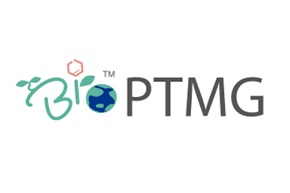Bio Poly(tetramethylene ether)glycolBioPTMG
Mitsubishi Chemical Corporation- Language

BioPTMG is a polyether polyol manufactured from plant-derived raw materials.
BioPTMG has the same performance as petroleum-derived PTMG as a raw material for polyurethane and polyester resins and has excellent impact, wear and hydrolysis resistance, flexibility at low temperatures, etc. Taking advantage of these characteristics, it can be used in a wide range of fields, from interior and fashion to industrial materials.
- Grades:
- BioPTMG650、BioPTMG1000、BioPTMG2000、BioPTMG3000
- Japan, Chemical Substances Control Law:
- (7)-129
- Japan, Poisonous and Deleterious Substances Control Law:
- Not applicable.
- Japan, Fire Services Law:
- Hazardous Material Class 4 Petroleums No.4 Hazardous Rank III(BioPTMG650)
Combustible Materials, Flammable Solids(BioPTMG1000, 2000, 3000)
Characteristics
[Close]
| Grade | BioPTMG650 | BioPTMG1000 | BioPTMG2000 | BioPTMG3000 |
|---|---|---|---|---|
| Appearance | Colorless transparent liquid ~ Solid white wax Colorless transparent liquid when melted |
Solid white wax Colorless transparent liquid when melted |
Solid white wax Colorless transparent liquid when melted |
Solid white wax Colorless transparent liquid when melted |
| Odor | Odorless | Odorless | Odorless | Odorless |
| Avg. Molecular Wt. | 650 | 1000 | 2000 | 2900 |
| Freezing point(℃) | 11 | 17 | 20 | 21 |
| Flash point(℃) | 237 | 247 | 240 | 246 |
| Specific gravity(40/4℃) | 0.982 | 0.979 | 0.976 | 0.974 |
| Viscosity (mPa・s) |
160(40℃) | 320(40℃) | 1400(40℃) | 3450(40℃) |
| Specific heat(kJ/kg・K) | ― | 2.0(40℃) | 2.0(40℃) | ― |
Applications
[Close]
BioPTMG shows the following outstanding characteristics as a soft segment of polyurethane and polyester resins. The resins obtained are used over a broad range of applications, from common consumer goods such as garments, to the industrial materials such as machine parts.
Applications are expected to continue to grow.
- Impact resilience
- Hydrolysis resistances
- Low temperature flexibility
- Wear resistance
- Tear resistance
- Fungus resistance
Main Applications
Polyurethane Application
- Polyurethane elastomers
Thermoset elastomers (TSU)
Thermoplastic elastomers (TPU) - Paints and coatings
- Polyurethane elastic fibers (Spandex)
- Adhesives and sealants
- Artificial suede and synthetic leather
Storage and Handling
[Close]
BioPTMG is hygroscopic and will degrade if exposed to oxygen or air, so it should be well-sealed with dry nitrogen.
BioPTMG is a white, waxy sold at room temperature, but will become a clear, colorless liquid upon heating. If it has solidified in the drum, it can be melted by holding the drum at about 70℃ for 24 hours. Avoid localized heating however. For storage in the liquid state, it is recommended to maintain temperature at less than 50℃.
BioPTMG650 is classified under the Japanese Fire Services Act as hazardous materials, Class 4, Petroleums No.4, Hazardous Rank III. Volatility is low, and it is unlikely to catch fire at room temperature. But if it is burning, extinguish the fire with dry chemical, alcohol-resistant foam, or large quantities of water. Although BioPTMG has relatively low toxicity and is relatively safe, use standard protective equipment such as goggles and gloves when handling it.
Lineup / Specifications
[Close]
| Molecular Weight | Hydroxyl value mgKOH/g |
Acid number mgKOH/g |
Moisture% | Volatiles% | Hue (Hazen) |
|
|---|---|---|---|---|---|---|
| BioPTMG650 | 650±50 | 160~187 | <0.05 | <0.03 | <0.1 | <50 |
| BioPTMG1000 | 1000±50 | 107~118 | <0.05 | <0.03 | <0.1 | <50 |
| BioPTMG2000 | 2000±100 | 53~59 | <0.05 | <0.03 | <0.1 | <50 |
| BioPTMG3000 | 3000±200 | 35~40 | <0.05 | <0.03 | <0.1 | <50 |
| Drum | 180kg,200kg(depending on grade) |
|---|---|
| Oilcan | 15kg |
Documents
[Close]
Catalogs
Inquiries Concerning Products
View the products of C4 & PBT Dept., Mitsubishi Chemical[Open in a new window]
